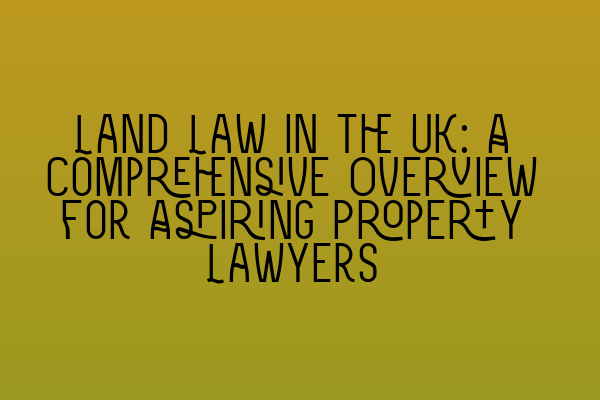Land Law in the UK: A Comprehensive Overview for Aspiring Property Lawyers
Welcome to SQE Property Law & Land Law, the leading solicitors in the field of land law in the UK. In this blog post, we will provide you with a comprehensive overview of land law, covering all the essential concepts and principles that aspiring property lawyers need to know. Whether you are preparing for the SQE 1 or SQE 2 exams, or simply looking to expand your knowledge in this area, this article will serve as a valuable resource.
Introduction to Land Law
Land law is a branch of property law that deals with the rights, interests, and responsibilities related to land and everything attached to it. It encompasses a wide range of legal concepts, including ownership, possession, use, and transfer of land. Understanding the complexities of land law is vital for anyone involved in property transactions or disputes.
Key Concepts in Land Law
1. Freehold and Leasehold
In the UK, land can be held either as freehold or leasehold. Freehold ownership grants the owner absolute rights over the land and buildings on it, while leasehold ownership involves a lease agreement with specific terms and conditions.
Learn more about the difference between freehold and leasehold here.
2. Tenure
Tenure refers to the legal framework that governs the relationship between the landowner and the state. It determines the rights and obligations of landowners, including payment of rent, taxation, and compliance with land-use regulations.
3. Easements and Covenants
Easements are rights granted to someone to use another person’s land for a specific purpose, such as access or drainage. Covenants, on the other hand, are legally binding promises between landowners regarding the use or restrictions on the land.
For more information on easements and covenants, check out our article here.
4. Adverse Possession
Adverse possession allows a person to claim ownership of another person’s land if they have been in exclusive possession of it for a specified period, typically 12 years. This concept has strict criteria that must be met to successfully establish a claim.
Land Law in Practice
Understanding land law is not just theoretical; it has significant implications in real estate transactions and property disputes. Property lawyers play a crucial role in assisting clients with various matters, including:
1. Conveyancing
When buying or selling a property, conveyancing is the process of legally transferring the ownership from one party to another. Property lawyers handle the legal aspects, ensuring a smooth and secure transaction.
2. Planning and Development
Property developers and landowners often require legal advice regarding planning permissions, zoning regulations, and environmental considerations. Property lawyers help navigate the complex landscape of planning and development laws.
3. Landlord and Tenant Matters
Landlord and tenant disputes can arise from various issues, such as non-payment of rent, termination of tenancy agreements, or breach of contract. Property lawyers provide guidance and representation for both landlords and tenants.
Learn more about our SQE 2 preparation courses here.
Conclusion
Land law forms the foundation of property transactions and disputes. As an aspiring property lawyer, having a comprehensive understanding of land law is essential to succeed in this field. We hope this overview has provided you with valuable insights and resources to enhance your knowledge. For more information on SQE 1 and SQE 2 exam dates and preparation courses, visit our website here.
